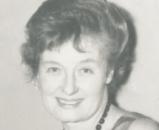Hesba Brinsmead was a highly significant writer of fiction for children and young adults. Born at Berambing, an isolated settlement in the Blue Mountains, Brinsmead used her early experiences in her Longtime books (most particularly in Longtime Passing, Once There was a Swagman, Longtime Dreaming and Christmas at Longtime).
Brinsmead's primary schooling was conducted by correspondence and she later attended a small church high school at Wahroonga, Sydney. A lack of finance led to her abandoning a teacher training course, however she still found work as a governess and schoolteacher. After saving from these and other jobs, Brinsmead paid for a course in journalism and began publishing novels in the 1960s.
Brinsmead's first novel, Pastures of the Blue Crane, appeared in 1964 and won both the Children's Book Council Book of the Year Award and the Dame Mary Gilmore Award in 1965. This book set the tone for many of Brinsmead's future works with its strong message about the environment.
In 1972, Brinsmead published Echo in the Wilderness, a novel highlighting the threat to Lake Pedder, Tasmania. Over the next decade, Brinsmead was active in the movement to save the lake from flooding. Although unsuccessful, the campaign inspired Brinsmead's 1983 book, I Will Not Say the Day Is Done.
Brinsmead married Reginald Brinsmead in 1943 and bore two sons, Bernard and Kenneth. The family lived in Victoria's Mallee district (prior to the birth of the boys) and in Melbourne, and eventually settled on the Tweed coast in northern New South Wales. Although divorced from her husband in the 1990s, Brinsmead remained close friends with him. She continued to live at Terranora until 2001 when debilitating osteoporosis (from which she had suffered for many years) forced a move to a retirement village in Murwillumbah.
 114896895249713976.png
114896895249713976.png

